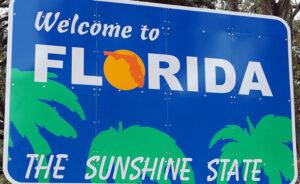Between a short-term rental vs long-term rental, which is the better choice? Each one has its pros and cons. However, there are many factors you should consider before deciding whether to put your property up for rent.
What’s the Difference Between a Short-Term Rental vs Long-Term Rental?
Every state defines short term vs long term rentals differently. Hence, it’s important to know how the state of Florida defines each of these.
Short-Term Rental
In the state of Florida, there isn’t a difference between a short term rental vs vacation rental. Let’s refer to the Florida Department of Business & Professional Regulation (DBPR) website to provide a clearer definition.
According to the DBPR, a vacation rental or short-term rental in Florida is:
“Any unit or group of units in a condominium or cooperative or any individually or collectively owned single-family, two-family, or four-family house or dwelling unit that is also a transient public lodging establishment but that is not a timeshare project.”
 This means both dwelling units and condos can serve as vacation rentals.
This means both dwelling units and condos can serve as vacation rentals.
Furthermore, the Robinson & Cole law firm defines it as dwelling units that are rented for less than 30 consecutive days. The unit must also be rented out more than three times per calendar year.
It’s also considered a short-term rental if you market the dwelling place as a frequently rented property to visitors.
In addition, short-term rentals are different from bed & breakfasts, motels, and hotels because of what they provide.
That’s because these short-term rentals typically offer independent living facilities for one or more persons. Unlike hotels and similar establishments, these facilities offer sleeping, living, eating, cooking, and sanitation provisions.
Long-Term Rental
A long-term rental in Florida is also considered an annual or yearly vacation rental. They’re considered long-term rentals if guests stay at least 181 days (about 6 months) in the property.
These types of rentals are different from short-term ones because they’re usually unfurnished. Moreover, they are more pet-friendly and don’t require property owners to pay for utilities.
What Are the Factors to Consider?
Before deciding between a short-term rental vs long-term rental, there are a few things you need to weigh.
Profitability
Short-term rentals have become a lucrative business. The prices are more flexible because they can change based on season, demand, and weather conditions. You can also charge higher for special events and holidays.
In addition, you can change the prices often. It’s a norm in the short-term rental industry, so it won’t necessarily put off renters.
However, short-term rentals don’t guarantee income. Bookings will usually fluctuate between the on and off seasons.
Meanwhile, long-term rentals are less flexible and lucrative. You can’t charge too high as renters expect to pay much less for the longer lease duration.
Long-term rentals also have a set price every month. Thus, they will have less income potential.
But, they are more stable as they guarantee you monthly earnings. Long-term rentals also don’t require you to pay for utilities like gas, WiFi, or electricity.
Location
The location of your property also matters when deciding between short-term rentals vs long-term rentals.
While Florida has general rules regarding short-term rental properties, conditions for the industry vary between cities and counties.
For example, Clearwater Beach is a popular destination for vacations. However, it’s harder to set up shop there because of CDC Sections 1-104.B & 3-919.
It states that the city doesn’t allow short-term rentals within residential areas of 30 days or less. However, it does permit vacation rentals of more than one month.
Other destinations, like Destin and Fort Walton Beach, limit the number of people allowed in short-term rentals. The maximum capacity they’ve enforced is 24 people at a time.
Meanwhile, cities like Jacksonville are more flexible. It allows short-term rentals in residential areas with single-family homes, townhouses, and duplexes. The property owners only need to have a certificate and abide by a few other regulations.
Regardless, it’s best to check the regulations in your area, as some cities prohibit short-term rentals entirely.
Property Size
The property size is also important to consider when deciding between short-term rental and long-term rental.
That’s because short-term rentals are more flexible when it comes to size. In fact, you can even rent out something as small as a room for short-term rentals.
This allows you to accept multiple renters simultaneously, such as with an Airbnb setup.
Meanwhile, long-term rentals are usually larger — usually entire homes or condo units. That’s because long-term renters expect to be able to live on the property properly.
As such, they need full access to the rental property without sharing the space with other guests.
Maintenance Costs
You also need to consider the cost of maintenance when choosing between a short and long-term rental.
Long-term rentals will wear and tear more because people occupy them longer. However, renters are more likely to take care of your property because they actually live in it.
Long-term rental properties also don’t require many furnishings. Renters don’t expect it because they prefer furnishing the interior themselves.
They also pay a deposit to decrease maintenance costs when they damage the property.
Meanwhile, short-term rentals may have less wear and tear because they’re vacant for certain periods. However, renters can be less careful because they don’t live in the unit.
Short-term rentals also require more furnishing. Renters will easily complain if your floors are dirty or if some provisions aren’t in top shape.
They may also leave bad reviews to warn other renters from renting your property. The bar is higher so it requires more upkeep.
Current Trends
 The short-term rental industry is a lucrative business that has grown in popularity. In fact, the potential market volume of short-term rentals may go over $20 billion by 2027.
The short-term rental industry is a lucrative business that has grown in popularity. In fact, the potential market volume of short-term rentals may go over $20 billion by 2027.
VISIT FLORIDA also recorded over 120 million visitors to Florida in 2021. That number jumped to 130 million visitors the following year.
This means we can expect the number of visitors to grow in the years to come. As a result, the demand for short-term rental properties may grow in the future.
However, there are other trends you need to think about. One is how the vacation rental industry suffered from losses during the pandemic.
Lockdowns and travel restrictions prevented short-term rentals from operating. Moreover, the culture has changed since the world started moving again.
More people are working from home nowadays. Thus, many are considering long-term rentals more than short-term ones.
Many renters have also left big cities in favor of renting cheaper homes in suburban areas.
Lifestyle Goals
You should also consider the lifestyle you want before you decide. Vacation rentals tend to only have guests in short bursts.
Thus, you can use the rental as your vacation home whenever there’s a reservation gap. You can also block off dates when you want to use it for a vacation.
Meanwhile, long-term rentals cannot afford you this luxury. They’re off-limits for the lease term, which usually lasts months to years.
However, managing a short-term rental entails more responsibilities. Not only will you need to maintain the property, but you’ll also have to market it frequently.
There’s also the need to respond to guests, coordinate with them, and keep up with online listings. You can outsource these responsibilities to a property management company. But, it will cost more.
Are There Rules or Legal Aspects to Consider?
Apart from profitability, maintenance, and personal conditions, you should also consider the rules and legal requirements.
Regulations
Both local and state governments favor long-term rentals over vacation rentals. In fact, the state of Florida has many short-term rental regulations that you have to follow.
Furthermore, many local jurisdictions place restrictions on short-term rentals. Some municipalities dislike them and cap the number of days you can rent your property. Other locations ban short-term rentals altogether.
Also, short-term rental regulations can change more frequently over the years. Thus, checking with your local county or municipality is crucial before considering short-term rentals.
Building Rules
Florida has wonderful weather that attracts many visitors. However, the good weather also encourages them to throw loud parties on short-term stays.
That said, many luxury buildings generally dislike short-term rentals as they can bother other clients. Others allow for short-term rentals but disallow Airbnb.
Remember to verify whether the building you’re considering allows for short-term rentals. Otherwise, you may need to pay fines if you break their rules.
Licensing
The DBPR mandates all holiday rentals in Florida to get a license, including Airbnb. Hence, you must apply for a vacation rental license for short-term rentals.
However, rented-out single rooms are an exemption. They’re not required to get a license from the DBPR. If your housing complex rents out rooms, you may be able to have fewer licensing requirements.
On the other hand, long-term rentals may still need a license in Florida, but it will depend on your local county regulations.
Taxes
Short-term rentals have tax breaks they can benefit from. You can sometimes even write off all of your rental expenses to limit your tax responsibilities. Meanwhile, long-term rentals don’t have these types of tax cuts because renters stay longer.
However, this isn’t the only tax-related factor you must think of. There are others. For instance, you may lose your homestead tax exemption if you rent out a homestead residence as a vacation rental.
Short-term rentals are also required to charge sales taxes or Tourism Development Taxes and give them to respective government departments or counties.
Frequently Asked Questions
Are Short-Term Rentals a Good Investment?
Yes, they are a good investment because they can provide ample gains. Tourists are more willing to pay higher costs for luxurious rentals because they’re on vacation. They’re also willing to pay premiums for properties in popular tourist areas.
 Is There a Difference Between a Short Term Rental vs Airbnb?
Is There a Difference Between a Short Term Rental vs Airbnb?
Airbnb is a third-party platform that allows users to rent their properties in the short term. Meanwhile, a short-term rental can be coursed through Airbnb or other online platforms.
Some examples of other short-term or vacation rental platforms include Vrbo and Booking.com. Short-term rental property owners can also use direct booking through a separate website.
Making the Right Choice
Deciding between a short-term rental vs long-term rental can be difficult. The former is more lucrative and flexible, while the latter is more stable and easier to handle. If you weigh the pros and cons of each, you can easily decide.
Whatever you choose, it can be hard to manage a property yourself. We recommend outsourcing the harder tasks to a property management company instead. If you can’t find one in Florida, you can start by looking through our online directory today.
RELATED ARTICLES: